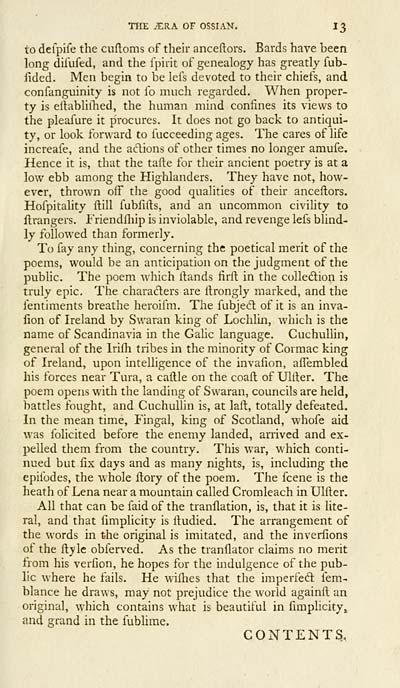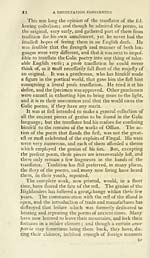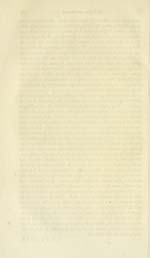Download files
Complete book:
Individual page:
Thumbnail gallery: Grid view | List view

THE iERA OF OSSIAN. 1 3
to defpife the cufloms of their anceftors. Bards have been
long dilufed, and the fpirit of genealogy has greatly fub-
fided. Men begin to be lefs devoted to their chiefs, and
confanguinity is not fo much regarded. When proper-
ty is ellabhlhed, the human mind confines its views to
the pleafure it procures. It does not go back to antiqui-
ty, or look forward to fucceeding ages. The cares of life
increafe, and the adions of other times no longer amufe.
Hence it is, that the tafte for their ancient poetry is at a
low ebb among the Highlanders. They have not, how-
ever, thrown off the good qualities of their anceftors.
Hofpitality Hill fublills, and an uncommon civihty to
llrangers. Friendlliip is inviolable, and revenge lefs blind-
ly followed than formerly.
To fay any thing, concerning the poetical merit of the
poems, would be an anticipation on the judgment of the
public. The poem which Hands firfl in the collection is
truly epic. The characT:ers are ftrongly marked, and the
fentiments breathe heroifm. The fubje(5t of it is an inva-
fion of Ireland by Swaran king of Lochlin, which is the
name of Scandinavia in the Galic language. Cuchullin,
general of the Irifli tribes in the minority of Cormac king
of Ireland, upon intelhgence of the invafion, aflembled
his forces near Tura, a caftle on the coafl of Ulfter. The
poem opens with the landing of Swaran, councils are held,
battles fought, and Cuchuhin is, at laft, totally defeated.
In the mean time, Fingal, king of Scotland, whofe aid
was folicited before the enemy landed, arrived and ex-
pelled them from the country. This war, which conti-
nued but fix days and as many nights, is, including the
epifodes, the whole itory of the poem. The fcene is the
heath of Lena near a mountain called Cromlcach in Ulfter.
All that can be faid of the tranflation, is, that it is lite-
ral, and that fimplicity is ftudied. The arrangement of
the words in the original is imitated, and the inverfions
of the ftylc obferved. As the tranllator claims no merit
from his verfion, he hopes for the indulgence of the pub-
lic where he fails. He wilhes that the imperfed: fern-
blance he draws, may not prejudice the world againft an
original, which contains what is beautiful in fimplicity,
and grand in the fublime.
CONTENTS,
to defpife the cufloms of their anceftors. Bards have been
long dilufed, and the fpirit of genealogy has greatly fub-
fided. Men begin to be lefs devoted to their chiefs, and
confanguinity is not fo much regarded. When proper-
ty is ellabhlhed, the human mind confines its views to
the pleafure it procures. It does not go back to antiqui-
ty, or look forward to fucceeding ages. The cares of life
increafe, and the adions of other times no longer amufe.
Hence it is, that the tafte for their ancient poetry is at a
low ebb among the Highlanders. They have not, how-
ever, thrown off the good qualities of their anceftors.
Hofpitality Hill fublills, and an uncommon civihty to
llrangers. Friendlliip is inviolable, and revenge lefs blind-
ly followed than formerly.
To fay any thing, concerning the poetical merit of the
poems, would be an anticipation on the judgment of the
public. The poem which Hands firfl in the collection is
truly epic. The characT:ers are ftrongly marked, and the
fentiments breathe heroifm. The fubje(5t of it is an inva-
fion of Ireland by Swaran king of Lochlin, which is the
name of Scandinavia in the Galic language. Cuchullin,
general of the Irifli tribes in the minority of Cormac king
of Ireland, upon intelhgence of the invafion, aflembled
his forces near Tura, a caftle on the coafl of Ulfter. The
poem opens with the landing of Swaran, councils are held,
battles fought, and Cuchuhin is, at laft, totally defeated.
In the mean time, Fingal, king of Scotland, whofe aid
was folicited before the enemy landed, arrived and ex-
pelled them from the country. This war, which conti-
nued but fix days and as many nights, is, including the
epifodes, the whole itory of the poem. The fcene is the
heath of Lena near a mountain called Cromlcach in Ulfter.
All that can be faid of the tranflation, is, that it is lite-
ral, and that fimplicity is ftudied. The arrangement of
the words in the original is imitated, and the inverfions
of the ftylc obferved. As the tranllator claims no merit
from his verfion, he hopes for the indulgence of the pub-
lic where he fails. He wilhes that the imperfed: fern-
blance he draws, may not prejudice the world againft an
original, which contains what is beautiful in fimplicity,
and grand in the fublime.
CONTENTS,
Set display mode to: Large image | Transcription
Images and transcriptions on this page, including medium image downloads, may be used under the Creative Commons Attribution 4.0 International Licence unless otherwise stated. ![]()
| Early Gaelic Book Collections > Ossian Collection > Poems of Ossian, the son of Fingal > (27) |
|---|
| Permanent URL | https://digital.nls.uk/77583073 |
|---|
| Description | Selected books from the Ossian Collection of 327 volumes, originally assembled by J. Norman Methven of Perth. Different editions and translations of James MacPherson's epic poem 'Ossian', some with a map of the 'Kingdom of Connor'. Also secondary material relating to Ossianic poetry and the Ossian controversy. |
|---|
| Description | Selected items from five 'Special and Named Printed Collections'. Includes books in Gaelic and other Celtic languages, works about the Gaels, their languages, literature, culture and history. |
|---|

